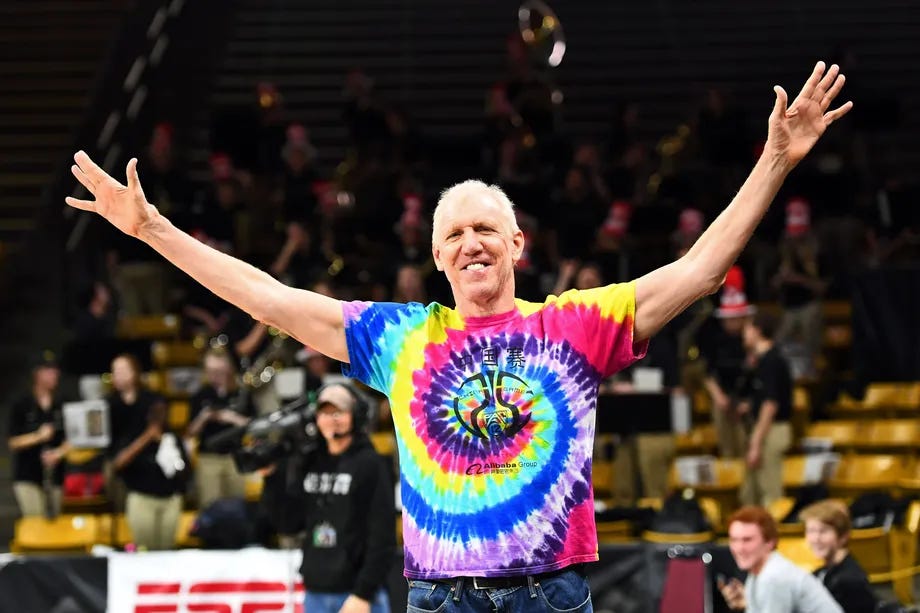5 Ways to Live Authentically
HOW TO BE YOURSELF AND LIVE WITHOUT REGRETS
I’m not a huge basketball fan. But I recently read and reflected on an article about the life of Bill Walton. He passed away at 71. Beyond his incredible sports achievements—three-time Pac-8 Champion, two-time NCAA Champion, two-time NBA Champion, Naismith winner, MVP, Hall of Famer, and much more—Walton was a unique character who lived authentically despite social pressures.
Walton's life offers insights into living true to ourselves. He protested the Vietnam War, became a quirky sports commentator, and stayed a devoted Deadhead. In the end, his authenticity resonated with millions and left a lasting impact.
Living Authentically: Why It Matters
Let’s face it. Living true to ourselves is tough. Society pushes us to conform and leads us to self-edit and live according to external expectations. Studies show 60% - 80% of people feel they're not living authentically. This isn't new; figures like Jesus, Socrates, Aristotle, Nietzsche, and Emerson emphasized knowing and being true to oneself.
Bill lived these principles. He embraced his individuality. Stood up for his beliefs. And accepted his unique complexities—and shortcomings. His life shows how authenticity leads to better mental health, life satisfaction, stronger relationships, and greater resilience. Yet, despite the evidence, many still struggle with authenticity.
The Science of Being Yourself
Psychologists identify four key components of authenticity:
Self-Awareness: Know who you are—strengths, weaknesses, desires, thoughts, and emotions. Recognize your true feelings and motivations without judgment. Understand what makes you tick, drives you, and holds you back.
Unbiased Processing: Accept your thoughts and experiences as they are without distortion. Look at yourself and your life objectively without letting fear, shame, or pride cloud your judgment. See the full picture and grow from your experiences.
Behavior: Act in ways that reflect your true self—not conforming to others' whims and wishes. Make choices based on your core values and beliefs even when it's unpopular. Authentic behavior requires courage but leads to a fulfilling life.
Relational Orientation: Be open and truthful in your interactions with others. Build relationships on honesty and transparency. This strengthens your bonds and lets others see and appreciate the real you to build trust and mutual respect.
How to Cultivate Authenticity
Here are five practical steps to help you live more authentically:
Be Real with Others: Embrace your uniqueness and don’t shy away from showing your true self—even if it's quirky or unconventional. Like Walton, share your thoughts, feelings, and opinions opening and honestly. Authenticity is magnetic and often inspires others to be real as well. Authenticity is endearing.
Speak Your Mind: Stand up for your beliefs. Voice your opinions and convictions, even if it means facing criticism or risking short-term consequences. Staying true to your principles is more important than pleasing others. Speaking your mind fosters integrity and respect. The temporary pain is worth the gain.
Explore Your Complexities: Take time to reflect and understand your multifaceted nature. Life isn’t black and white—we all have layers and contradictions. Journaling, mindfulness, and considering different perspectives are excellent tools. Embracing complexities is key to knowing yourself.
Accept Your Shortcomings: Acknowledge your limitations and use feedback to improve. No one is perfect. Walton faced numerous injuries but accepted his limitations and focused on what he could achieve. Embrace your shortcomings as opportunities for growth. Accepting criticism helps build a more authentic self.
Embrace Hardship: Living authentically can be challenging. It often means going against the grain and facing difficulties head-on. Overcoming obstacles and enduring short-term discomfort is necessary for long-term growth. The most rewarding experiences come from pushing through and staying true to yourself.
Embracing authenticity is a journey that leads to a more meaningful and impactful life. By living true to ourselves, we can better serve others and create deeper connections and relationship. The world is starving for authentic examples and role models to follow. Is it hard? Yes. But stay true to yourself. Be a square peg in a round hole. In the end, it’s more comfortable that faking it to fit in. And you’ll thrive in life.
P.S. I am offering a new course and 1:1 coaching opportunity on living with authenticity. But I'm only accepting 10 clients at this time. If you're interested, email tim@timothyeldred.com. That's the only way to find out about this exclusive offer. ◼︎


